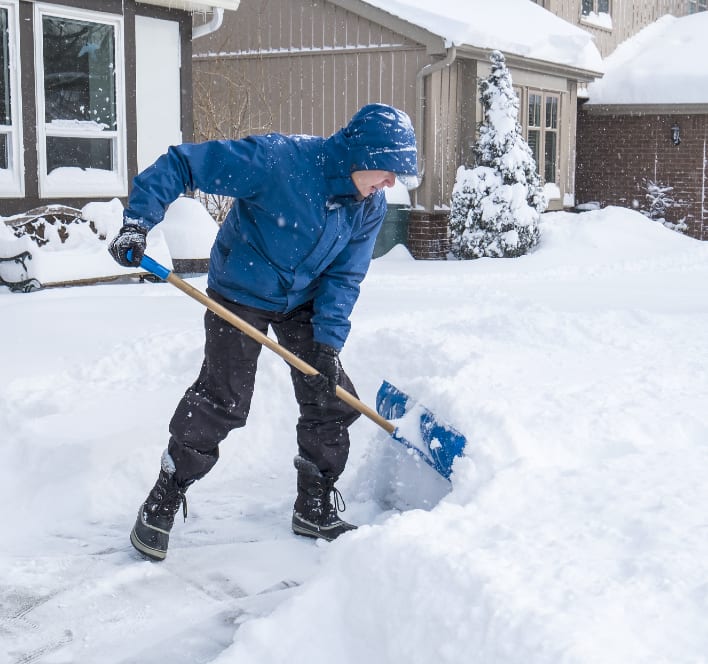The Northeast sees its fair share of snow between October and April, making shoveling an unavoidable part of winter. Many people start dreading the soreness and back pain flurries bring. However, if you take a few precautions, you can minimize aching muscles and avoid throwing out your back. If you feel back pain for a few days after shoveling snow, you might want to seek medical attention. You could be suffering from a back injury.
If you are still experiencing back pain from shoveling snow this past winter, contact NJ Spine & Orthopedic. Our board-certified back doctors know how to treat various back conditions and help you get back to the life you enjoyed before your pain.
Common Injuries from Shoveling Snow
Most snow-related injuries result from overworking your muscles or slipping on ice. Regardless of the cause, it is no surprise that back injuries are common in the winter months. The repeated movement is strenuous on the back, causing injuries such as:
- Lower back pain or strain: Poor posture contributes significantly to lower back pain or strains. It causes your weaker muscles to do more work and overstretches the spine’s ligaments. Always shovel with your back straight and push the snow whenever possible. If you must lift, use your knees.
- Herniated discs: When your spine moves out of alignment or pinches a nerve, a disc can bulge or herniate. To prevent this, keep your knees perpendicular to the snow you want to lift and pivot or walk toward where you want to dispose of it. Avoid throwing snow over your shoulder or to the side. You are more likely to throw your back out this way.
- Fractures, torn ligaments, and bruising: If you fall onto the pavement, you may fracture or bruise your backbone. You might also tear the connective tissue around your spine. Wear snow boots that have good treads to increase your traction. It is also a good idea to spread rock salt before shoveling to reduce the chances of a fall.
- Muscular back pain: Cramped, overtired, and spasming muscles are common when it is cold since low temperatures restrict blood flow. Muscular back pain can occur in your lower or upper back and shoulders. Maintain proper form when shoveling so you do not agitate these muscles, and stretch before you go out to increase blood flow.
While technically not an injury, sciatica pain may be exacerbated when shoveling snow as a result of a herniated disc or muscle spasm. Cold weather puts you at a greater risk of muscle sprains, and sudden movements can worsen your sciatica.
How to Prevent Injuries When Shoveling
There are steps you should take to avoid an injury from shoveling. For starters, try shoveling later in the day. Spinal discs naturally swell in the morning, and muscles are stiff since you were not active throughout the night. You also have a slower reaction time in the morning, which can increase your risk of falling. While it might be tempting to shovel when you wake up so it does not accumulate too much, it is best to wait until the late morning or early afternoon.
While you enjoy the morning, have a healthy breakfast. Eating foods rich in protein and complex carbohydrates can help prepare your body for physical activity and fuel your body with the nutrients it needs to sustain itself. This can also help hydrate your muscles to aid in recovery. Try eating oatmeal, Greek yogurt, mangos, or apples before shoveling. A healthy diet is not enough to prevent injury, but it’s an easy way to take care of your body.
It will also be in your best interest to invest in an ergonomic snow shovel. Snow can be heavy, and most shovels do not offer strong grips. A shovel with a longer pole, adjustable lengths, and curved shafts will help you bend less and reduce your chances of injury.
Contact the Back Doctors at NJ Spine & Orthopedic
This past winter seemed to bring more snow than usual in New Jersey, New York, and Pennsylvania, and you may have found yourself shoveling more than expected. If you’re suffering from lingering back pain from shoveling this past winter, contact the award-winning back doctors at NJ Spine & Orthopedic. Our doctors are dedicated to providing the best care possible to every patient. Call (866) 272-9271 or complete our contact form today to learn more about how we can help alleviate your back pain.

